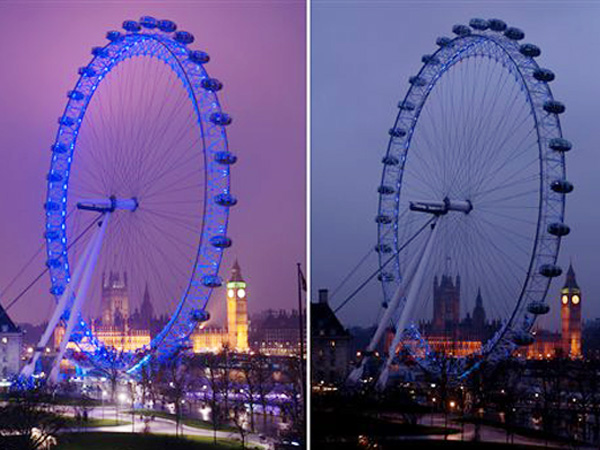World landmarks go dark for Earth Hour

Combination photos. The ‘London Eye’ and London skyline can be seen before (left) and after (right) the population of the city observed Earth Hour on Saturday, March 23, 2013. Earth Hour Global is a worldwide event organized by the World Wide Fund for Nature (WWF) encouraging households and businesses to turn off their non-essential lights for one hour to raise awareness about the need to take action on climate change. (Richard Stonehouse for WWF/Earth Hour Globa via AP Images)
The Empire State Building, the Eiffel Tower and the Kremlin — along with a slew of other landmarks around the world — went dark Saturday to draw attention to climate change.
In a symbolic show of support for the planet, people across the continents switched off their lights for 60 minutes — all at 8:30 pm local time.
In bustling New York, that’s exactly what happened when the Empire State Building pulled the plug on its nighttime brilliance.
Further south in Brazil, Rio de Janeiro’s Christ the Redeemer statue took the plunge into temporary darkness, along with the city’s famous Ipanema Beach.
In Argentina’s capital Buenos Aires, the city’s Obelisk, planetarium and other monuments and public buildings did the same.
Article continues after this advertisementIn Paris, the city of light, the Eiffel Tower turned off its illumination — but only for five minutes due to security reasons.
Article continues after this advertisementMoscow’s Kremlin meanwhile went dark for a full hour for the first time, following a decision by President Vladimir Putin.
Saint Mark’s Square in the heart of Venice switched off its lighting, turning to candles instead.
In the Serbian capital Belgrade, the national parliament, the national museum and all five bridges were among the landmarks that went without illumination.
In neighboring Bosnia, the lights went out at Sarajevo cathedral and at the Old Bridge in the southwestern town of Mostar, which dates back to the Ottoman Empire.
Earlier, Sydney had kicked off the event to cheers and applause from a small crowd that had gathered to see the skyline dim and Sydney Opera House turn a deep green to symbolize renewable energy.
“It’s been a very inspiring night because it’s all about hope and change,” said Jessica Bellamy, one of the spectators.
Japan switched off soon after Australia, with the illumination on the landmark Tokyo Tower dimming down as visitors were given the chance to pedal bicycles to generate power to illuminate an egg-shaped artwork.
The Hiroshima Peace Memorial, a designated UNESCO World Heritage Site in the country’s west, also sat in darkness.
In the Chinese capital Beijing, lights went out at the former Olympic stadium, the “Bird’s Nest,” while in the commercial hub of Shanghai buildings along the famed riverfront Bund took part.
Hong Kong’s iconic skyline appeared to vanish into the night as the neon lights and advertising hoardings that usually brighten the sky were turned off, leaving the harbor in darkness.
In Singapore, a crowd of almost 1,000 people watched from a floating platform as landmarks on the skyline dimmed, before a pulsating musical performance had people dancing in the dark ahead of a film screening.
India’s capital New Delhi switched off floodlights at some of its iconic monuments including Qutab Minar, Humayun’s Tomb and the sprawling Red Fort.
“Earth Hour” originated in Sydney with a simple appeal to people and businesses to turn off their lights for an hour to raise awareness of carbon pollution.
“I think the power of Earth Hour is in its ability to connect people and connect them on an issue that they really care about which is the environment,” said Dermot O’Gorman, head of WWF-Australia as the city stood in darkness.
“Earth Hour shows that there are millions of people around the world who also want to do something.”